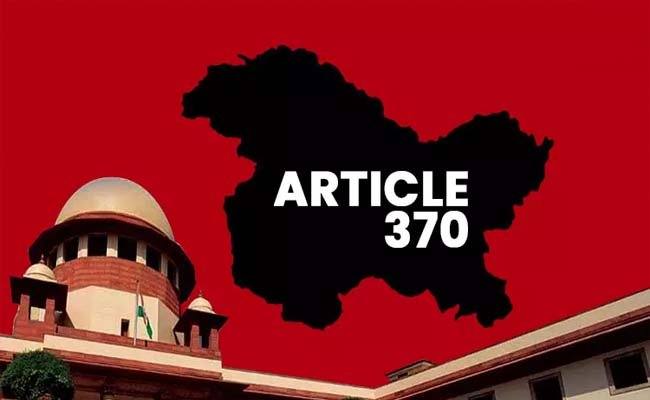– Abdul Bari Masoud
New Delhi: As Jammu and Kashmir completes six years since Article 370 was abrogated and the region turned into two Union Territories, a new report has accused the Union government of increasing alienation, weakening democracy, and enabling major human rights violations.
The report, titled “Statehood for Human Rights,” was released on August 4 by the Forum for Human Rights in Jammu and Kashmir. The Forum includes former judges, civil servants, military officers, and scholars. The report says post-2019 governance has failed both morally and constitutionally. It claims people have seen only fear, repression, and exclusion instead of peace, dignity, and development. It declares, “The time for restoration of statehood is now.”
This is the Forum’s sixth annual report. It spans 52 pages and is the most direct and critical one so far.
The Forum is led by Gopal Pillai, a former Union Home Secretary, and Radha Kumar, who served on the 2010 government-appointed interlocutor panel. Signatories include former Supreme Court judges Madan Lokur, Ruma Pal, and A.P. Shah. Military veterans H.S. Panag, Kapil Kak, Yoginder Kandhari, and Ashok Mehta also signed. Civil society members like Enakshi Ganguly, Ramachandra Guha, and Probir Sen are part of the Forum. Justice Hasnain Masoodi, a retired J&K High Court judge and former NC MP, is also a signatory and now leads the National Conference’s Human Rights Committee.
The report discusses the Assembly elections held in September–October 2024. This was the first election after nearly a decade. The National Conference won a clear majority. High turnout showed strong public demand for democratic governance. But soon after, that hope faded.
On July 12, 2024, just before the polls, the Union Home Ministry issued new rules. These rules gave key powers like appointments, law and order, and security to the Lieutenant Governor. The elected government lost its authority.
The new Omar Abdullah-led cabinet suggested a conflict-resolution mechanism between the elected government and the L-G. But the Home Ministry rejected it, citing the J&K Reorganisation Act, 2019. The Forum says this move destroyed the meaning of a representative government.
A major part of the report focuses on the April 22, 2025 Pahalgam terror attack. Militants attacked tourists near Baisaran meadow. They asked people to recite the kalma. Then they killed 25 people, mostly Hindu tourists. A local Kashmiri pony guide was shot while trying to protect the victims.
The Forum calls it the worst attack since Pulwama in 2019. It says the massacre was preventable. Intelligence had warned of possible infiltration. But CRPF was pulled out from the area in January 2025. No warning was issued. Security forces took more than an hour to respond.
Soon after the attack, J&K Police blamed local Kashmiris. National media spread the claim. But a June 2025 NIA investigation proved all attackers were Pakistanis linked to Lashkar-e-Taiba.
Meanwhile, the fallout was massive. Over 2,800 Kashmiris were detained or questioned. More than 100 were booked under UAPA or PSA. Six homes of alleged militants were destroyed using explosives. Journalists, including women, were harassed for their tweets.
The Forum says this was collective punishment. Kashmiri students and workers in Delhi, Haryana, Madhya Pradesh, and Punjab faced mob attacks, evictions, and abuse. No Union Minister condemned the violence.
Lt. Vinay Narwal’s widow, who called for peace, was trolled online. Kashmiri Pandit diplomat Vikram Misri and Col. Sofiya Qureshi were also targeted for speaking against hate. The Madhya Pradesh High Court ordered a case against Minister Vijay Shah, but the Supreme Court later cancelled the order.
In response to the Pahalgam killings, India launched Operation Sindoor. The mission targeted Lashkar and Jaish camps across the LoC and in Pakistani Punjab. Pakistan responded with four days of drone and missile attacks.
The result was deadly. Twenty-one civilians were killed in J&K, including five children. Five Indian soldiers lost their lives. Fifty-nine others were injured in Rajouri, Uri, and Poonch. The Forum says China helped Pakistan in this retaliation. It warns of a dangerous two-front military threat.
The report highlights how rights bodies in J&K have vanished. The Human Rights Commission, Women’s Commission, and Information Commission were abolished in 2019. They have not been restored, even ten months after the elections.
The National Conference’s internal rights committee has no legal power. Forum co-chair Radha Kumar says even elected MLAs can’t help victims.
The report says militancy has returned in Jammu’s hills. In 2024–25, over a dozen attacks took place in Udhampur, Doda, Kishtwar, and Kathua. Victims included soldiers, CRPF men, migrant workers, and village defence guards. Militants are again using forest routes.
The Forum has made urgent demands. It wants full statehood restored immediately, not in stages. It calls for a Parliamentary debate on special status, like Article 371 for other states. It urges repeal or major changes to the J&K Reorganisation Act. It asks for Ladakh to be brought under the Sixth Schedule. It also demands the return of rights commissions and an end to misuse of UAPA and PSA.
The report notes that the Supreme Court avoided ruling on whether a state can be downgraded to a Union Territory. But Justice Sanjiv Khanna, in his separate opinion, said the move was unconstitutional.
Justice Madan Lokur said peace cannot be built on humiliation. He warned that continued suppression of elected institutions puts India’s federal system at risk. Lt. Gen. H.S. Panag added that the Kashmir issue now affects the soul of India.




